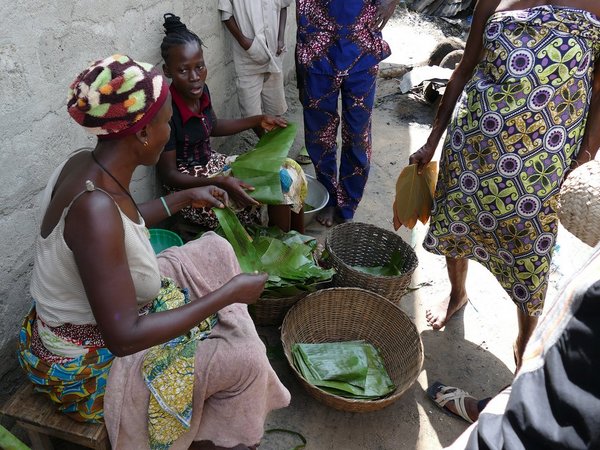 Read this article in French
Read this article in French- Share this article
- Subscribe to our newsletter
Plant leaves as a packaging alternative to plastic
Since 2018, given the environmental problems caused by packaging material rubbish, the Government of the West African state of Benin has banned the use of non-bio-degradable plastic bags. In a joint project, scientists at the University of Bonn/Germany are now attempting to develop sustainable packaging made of natural material such as banana leaves with their colleagues from Abomey Calavi University, near Cotonou in Benin.
“Since Benin is one of the poorest countries in the world and still has more than a million inhabitants who are undernourished, protecting food with packaging is particularly important,” explains Professor Judith Kreyenschmidt, who heads the project at Bonn University’s Institute of Animal Sciences. This protection is above all important in transportation, since the absence or suboptimal quality of packaging can lead to the loss of valuable food. However, especially in countries like Benin, which have no waste management industry, excessive use of plastic may result in high environmental pollution.
This is why one goal of the “West African local food packaging” (WALF-Pack) project is to further develop old packaging techniques using plant leaves and optimise them by combining them with new technologies. Traditionally, much food, such as various mashes, is still packaged in leaves of bananas or other local plants. Not only does this serve protecting, transporting or presenting products, it can sometimes also refine their taste.
As the University of Bonn explains in a press release from mid-February, the WALF project is pursuing a number of approaches in the development of packaging. While old packaging methods are to be upgraded, new, sustainable materials such as bioplastics are to be used in combination with sustainable active coatings, so-called active packaging. Such packaging features an active component slowing down food decay.
In order to ensure an optimal development of packaging suitable for local conditions, doctoral student Barbara Götz regularly visits Benin. There, the expertise of a network of local packaging companies, merchants, manufacturers, non-governmental organisations (NGOs) and scientists of Abomey Calavi University is concentrated to optimally adapt solutions to the local market.
Packaging made of water hyacinths
Together with the Beninese NGO “Jeunesse et Emplois Verts pour une Economie Verte” (JEVEV), which makes baskets, bags and other useful items out of the dried stems of the water hyacinth, scientists are examining whether this plant could also be useful as a local packaging material. The water hyacinth is an invasive plant from South America that thrives in the environmental conditions offered in Africa, where it clogs up the lakes and rivers.
An ongoing laboratory experiment in the context of the project has demonstrated that the plants harvested are not contaminated with heavy metals and are therefore suitable as packaging material for food. “In future, the NGO JEVEV seeks to extend its portfolio by manufacturing paper on the basis of water hyacinths, which is to create additional economic structures and jobs that are to be combined with biodiversity conservation and environmental protection,” Götz explains. These prerequisites form a sound base for the development of sustainable packaging using the water hyacinth.
The WALF Project Consortium
The Consortium for the sustainability project consists of the University of Bonn/Germany and Abomey Calavi University/Benin. It is supported by a network of manufacturers, processing companies, public institutions and packaging firms. Germany’s Federal Ministry of Food and Agriculture (BMEL) is funding the “WALF-Pack” with 350,000 euros for a total of three years.
(University of Bonn /idw/wi)





Add a comment
Be the First to Comment